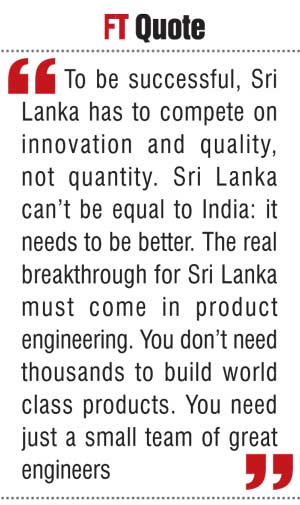Saturday Feb 21, 2026
Saturday Feb 21, 2026
Thursday, 8 October 2015 00:00 - - {{hitsCtrl.values.hits}}
 The Sri Lankan IT industry is today at a critical juncture, offering an exciting vision of export growth potential. To execute this vision, the IT industry must not only leverage the country’s unique advantages, it also requires a proactive and coordinated national-level program to create a vibrant software engineering “ecosystem”.
The Sri Lankan IT industry is today at a critical juncture, offering an exciting vision of export growth potential. To execute this vision, the IT industry must not only leverage the country’s unique advantages, it also requires a proactive and coordinated national-level program to create a vibrant software engineering “ecosystem”.
What can we learn from the MillenniumIT story?
A pioneer among Sri Lanka’s software information technology companies, MillenniumIT (or “MIT” as we are sometimes called locally) has made a global name for itself as being on the cutting edge of technology for the world’s financial markets. Our software products power over forty leading stock exchanges, brokers, clearing houses, depositories and regulators around the world. We are proud to have built the world’s fastest and most reliable trading system right here in Sri Lanka on our “Silicon Island”.
We operate with a strong global focus – our people work with clients spanning from London to Lima, New York to Nairobi. Competing everyday with global technology companies from Silicon Valley, New York and Europe, we own our entire software stack and product life cycle. This includes completely engineering a concept from end-to-end, analysing market viability, system requirements, product design and development, and testing. Then of course, we have to sell the system and handle client deployment and support.
What are the takeaways?
SLASSCOM published a report last year detailing the three stages of development of Sri Lanka’s IT industry. The first is outsourced, or ‘captive’, development, where an overseas firm contracts a company in Sri Lanka to develop their product for them. This is a successful business model.
The second stage is what we call customised development. Think of a foreign IT company setting up in Sri Lanka and creating an operation that builds some part of their software that the company then sells internationally.
The third stage is product engineering. This is where a Sri Lankan company controls the entire process – from concept to finished product, to create intellectual property that belongs to Sri Lanka. This is SLASSCOM’s 2022 vision.
If you compare competing countries in that first stage – India, China, the Philippines – they have an advantage Sri Lanka doesn’t: numbers. They have many more people. If you look at all the IT graduates coming out of Sri Lanka – it’s maybe 10,000 a year. If you look at large IT services companies in India, like Infosys, they each hire 20-30,000 graduates a year. Sri Lanka can’t play that game.
Therefore, to be successful, Sri Lanka has to compete on innovation and quality, not quantity. Sri Lanka can’t be equal to India: it needs to be better. The real breakthrough for Sri Lanka must come in product engineering. You don’t need thousands to build world class products. You need just a small team of great engineers.
Building great products isn’t quick or easy. It’s actually pretty hard. It takes a great deal of focus, commitment and perseverance to produce a successful product. Staying successful is even harder, as you will have competitors around the world that won’t stand still. But Sri Lankans are up to the challenge. Sri Lanka has built world-beating products for the financial markets, and can do the same in other sectors.
Sri Lanka has a strong engineering legacy dating back to the impressive irrigation systems and architecture built in ancient times. We must tap into this remarkable heritage.
The world has also been coming to Sri Lanka to trade for centuries, and I feel that these centuries of broad interaction have given Sri Lanka a unique and cosmopolitan cultural heritage. Sri Lankans are effective communicators and have a distinct capability to connect with diverse cultures around the world. This soft cultural skill is a distinct advantage when it comes to understanding global markets and selling software.
This is the new era of Uber, Bitcoin, and machine learning (aka artificial intelligence). Every day around the world we’re seeing new examples of innovation, business disruption, and disintermediation of established companies and industries. The technology industry has never moved faster. At MillenniumIT we like to say “innovation is power,” and this drives everything that we do.
There are a few key lessons on innovation from Silicon Valley that should be considered. Startups in Silicon Valley don’t appear out of nowhere. They grow from a highly developed ecosystem of talent, funding, educational support and infrastructure, all of which has taken many decades of private and public sector support to develop. Here in Sri Lanka, we need to fast track the development of our own software ecosystem that supports innovation, nurtures engineering talent, and drives investment.
Quality of talent, not quantity, is the answer for the Sri Lankan IT industry to get ahead of this innovation wave. The new national coalition government needs to act with urgency on scaling the national education system to significantly widen the pool of creative engineers joining the workforce. The national secondary school and university systems need a focused investment in capacity, leveraging domestic financial support as well as backing from global educational institutions. SLASSCOM has also proposed a number of academic and vocational training programs that deserve close attention.
Pro-growth programs to directly support the IT industry are also sorely needed, including those outlined in the IT Industry Development Program proposed by ICTA Sri Lanka. These programs need to be driven with focus and accountability if our technology industry is to realise its full potential as a major export revenue driver. The recent announcement of Google’s Loon project to provide nation-wide wireless internet coverage, in partnership with the leading telcos and the government, is a great example of the kind of inclusive tech engagement that the country needs.
MillenniumIT, SLASSCOM, AMCHAM and many others stand ready to help. With the right support, the potential of this “Silicon Island” is limitless.
[The writer is CEO of MillenniumIT. Mack was chosen as a member of the Young Global Leaders, an affiliate of the World Economic Forum, and is a Board Member of the International Association for Quantitative Finance (IAQF).]